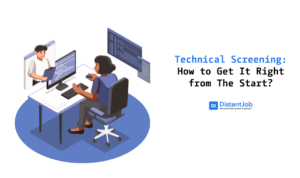Magento is one of the most used eCommerce frameworks in the world, over 270,000 merchants choose it for their businesses. Plus, businesses attribute 10-80% of their revenue uplift to Magento.
Companies with this type of business hire Magento developers who are in charge of developing, maintaining, and improving their client’s eCommerce websites. This means they have a big responsibility upon their shoulders as this type of website tends to generate a lot of revenue and screening a candidate for a Magento interview, requires having the right Magento interview questions.
To hire a Magento developer, you need someone who’s not only an expert in this platform but also with PHP as this is the programming language used. It also uses MySQL or MariaDB as its database management. With Magento 2, your developers can also use the JavaScript library Knockout.js for front-end code.
With this platform, you have the choice between Magento Enterprise, which is a premium version with more functionality but also much more expensive, Magento Community, the free and most-used version of Magento, and Magento Go, the hosted solution that is rarely used and best fitted towards smaller retailers.
Magento doesn’t have many pitfalls as an e-commerce platform. However, it is important to note that it runs PHP, which many developers don’t prefer. PHP sometimes can have issues struggling with the amount of RAM consumed by a Magento application.
The second potential pitfall is that this platform can have a steep learning curve, unlike WordPress or osCommerce.
So, while there are a couple of cons with Magento, the benefits certainly outweigh them, and almost all of the pitfalls can be avoided if you hire a Magento developer who’s an expert. If you want to make sure you find the best possible developer for hire, here are the essentials Magento interview questions that will help you prepare for your next Magento Interview.
Essential Interview Questions To Ask a Senior Magento Developer – Coming Directly from our Recruiters
1. Explain EAV and when you should and should not use it
This is a great feature of Magento that gives more flexibility to their databases. With EAV, or Entity Attribute Value, your developer is able to add an unlimited number of columns to your table.
This is because different tables hold the “attribute” data, or table field names, and different tables that hold “entity,” the id or primary id, and the value, which is the value for that id, for each attribute.
So, there is one table that holds all attribute values, called eav_attribute, and 5-6 different tables that hold entity and data in their fully normalized forms:
- eav_entity, eav_entity_int (for holding Integer values)
- eav_entity_varchar (for holding Varchar values)
- eav_entity_datetime (for holding Datetime values)
- eav_entity_decimal (for holding Decimal/float values)
- eav_entity_text (for holding mySQL Text type values)
While this type of database can be very helpful in terms of flexibility and ability to add a table field in the future, it also requires more energy and space, meaning that it should only be used when you are unsure about exactly how many fields in a table will be necessary.
2. What is the difference between Mage::getSingleton() and Mage::getModel()?
In Magento, the difference between Mage::getSingleton() and Mage::getModel() is that the former will search for an existing object within the same class and only create a new object if no existing one is found, whereas the later always creates a new object.
If you want to “create an object once, modify it and later fetch from it,” you would likely use Mage::getSingleton(), which employee’s PHP’s singleton design pattern. A popular use case for this would be creating a session object, such as cart values, in which values can be added or removed across numerous pages.
Mage::getModel(), on the other hand, is utilized when you want to “have the fresh data from the database,” such as, showing records from the database.
3. What is MVC?
In Magento, this is the Model-View-Controller (MVC) architecture. Each MVC architecture is slightly different, but their ultimate goal is to split data access, business logic, and user-interface code from one another.
They can be either convention-based or configuration-based, but Magento is configuration-based, which means that your developer needs to exactly specify the module’s config file for it to work properly.
4. Explain some short, common programming tasks
While your Magento developer for hire will need to understand conception things about the platform, such as what EAV is, they also need to know some common programming tasks.
For example, how they will get the total price of items that are currently in the cart:
helper(‘checkout’)->formatPrice->(Mage::getSingleton(‘checkout/cart’)->getQuote()->getGrandTotal()); ?>
Or how they can set different themes for users who are logged in:
if(Mage::getSingleton(‘customer/session’)->isLoggedIn()):
Mage::getDesign()->setPackageName(‘package_name’)->setTheme(‘themename’);
Endif;
Or how to fetch the 5 best selling products:
Mage::getResourceModel(‘reports/product_collection’)
->addOrderedQty()
->addAttributeToSelect(‘*’)
->setPage(1, 5)
->load();
5. What is the difference between EAV and flat model?
EAV database model is fully in normalized form. This means that the value in each column (called attribute in EAV) is stored in their respective data type table which makes it more complex as they have to join 5-6 tables even if you need only one detail.
On the other hand, flat model only uses one table. It’s not normalized and uses more database space. Its not useful for dynamic requirements where you may have to add more columns (called fields in flat model) in the future. Its performance is fast because it only needs one query instead of joining 5-6 tables.
6. Define and explain the Magento product types
- Magento simple product: It’s used for a single item without any specific variations.
- Magento grouped product: It’s used for a combination of Magento simple products.
- Magneto configurable product: It’s used for a single item with specific variations.
- Magento virtual product: It’s used for a virtual item.
- Magento bundle product: It’s used for a bundle of simple products.
- Magneto downloadable product: It’s used for online software items.
7. Demonstrate how can you change theme for login users
To change theme for login users,
if(Mage::getSingleton('customer/session')->isLoggedIn()):
Mage::getDesign()->setPackageName('package_name')->setTheme('themename');
endif;
8. How can you enhance the Magento performance
To enhance the Magento performance there are several things you can do. For example:
- Enable Magento caching
- Combine external CSS/JS into one file
- Disable the Magento log
- MySQL Query Caching
- Disable any unused modules
- Image optimization
- Enable Gzip compression
Final thoughts
If you’ve tried to recruit and interview a Magento developer before, you know how hard it can get. Hopefully, these Magento Interview Questions will help you find the right candidate for your team. If you don’t want to struggle to find a local candidate, let us help you. As a remote recruitment agency, we’ve been in this business for almost a decade. We know how to hire candidates with the necessary hard skills and the qualities that make an excellent remote worker.
If you want us to do all the hard work for you to hire a remote Magento developer who you can be certain is an expert and certified, we can find you a vetted and guaranteed specialist. Then, you don’t even have to worry about the difficult interview process.




